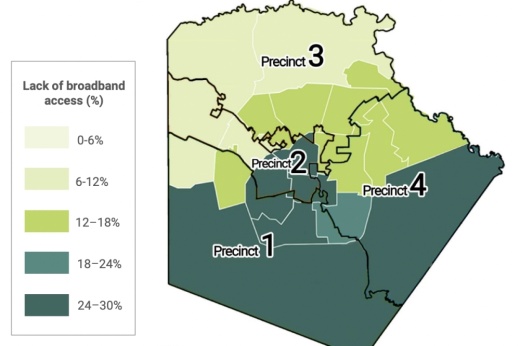Bexar County is setting aside $25 million in federal COVID-19 relief funds to support private/public collaborative efforts to expand affordable internet service.
Addressing a request from local nonprofit SA Digital Connects, the commissioners court on Aug. 9 approved a $25 million budget to cover different ways of reinforcing the growth of broadband infrastructure.
The $25 million comes from the total $389 million allocation of American Rescue Plan Act funds that the county received from the federal government to address emergency assistance and other pressing needs resulting from the pandemic.
SADC Executive Director Marina Aldrete Gavito said her organization spearheaded public/private community collaboration toward crafting a community equity plan focused on providing internet access and developing digital skills in unserved and underserved areas.
According to SA Digital Connects, the nonprofit seeks to improve digital access among local moderate- to low-income households, older adults, veterans, disabled individuals and workforce populations as well as in telemedicine and digital forms of justice system service.
“Now we’re focused on implementing that plan and making sure we have dollars to address our digital divide, and we’ll track and report progress along the way,” Gavito said.
Gavito said SA Digital Connects and its public and private sector partners could leverage the new infusion of ARPA funds and ask internet service providers to contribute dollar-for-dollar matching amounts. That way, Gavito said, $25 million could possibly turn into $50 million.
“Then we could start connecting communities that way,” Gavito said.
According to Gavito, between 18%-30% of residents in Bexar County precincts 2, 3 and 4 have no immediate access to broadband internet service.
Those precincts cover much of the core of San Antonio and the far west, south and east sides of the county. According to the U.S. Census Bureau, 20% of all county households are not connected to internet service.
Gavito said, with ARPA funds in tow, her organization and their community partners will re-emphasize digital access improvements in those under-served communities.
Earlier in August, SA Digital Connects partnered with local nonprofit Family Service and the city’s innovation office to create an affordable connectivity program toolkit to encourage residents to sign up for a $30-per-month subsidy, Gavito said. Here, participating internet service providers must offer a $30/month service plan, Gavito said.
“When residents are enrolled in the affordable connectivity program, they could be getting internet for free,” she added.
Pct. 4 Commissioner Tommy Calvert said he is happy that federal funds will be used to boost digital equity in Bexar County’s most vulnerable communities. He also encouraged local small and minority-owned businesses to seek out contract work when it comes to building physical internet infrastructure in neighborhoods.
“This is a big issue—diversity in the [information technology] sector,” he said.
According to Gavito, SA Digital Connects strives to address all parts of the digital divide issue—costs of building infrastructure; costs of providing internet service; and affordability, access and digital literacy for end-users, especially low-income residents.
Precinct 2 Commissioner Justin Rodriguez said the county allocating ARPA funds is just another step toward reducing the local digital gap.
“It’s a significant start,” Gavito said.





